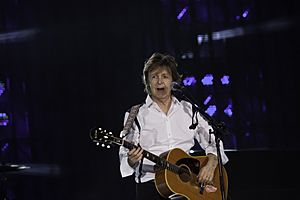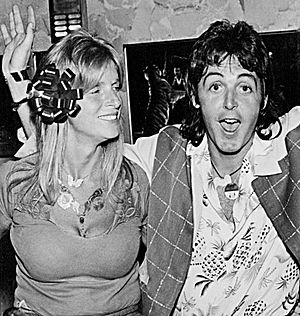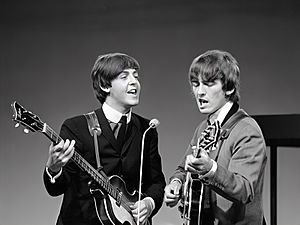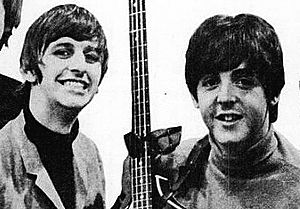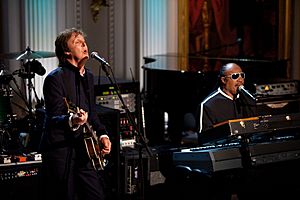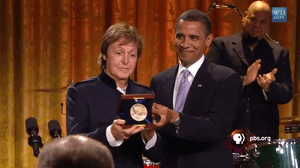Paul McCartney facts for kids
Quick facts for kids
Paul McCartney
|
|
|---|---|

McCartney in 2024
|
|
| Born |
James Paul McCartney
18 June 1942 Liverpool, England
|
| Other names |
|
| Occupation |
|
| Years active | 1957–present |
| Spouse(s) |
|
| Children | 5, including Heather, Mary, Stella and James |
| Relatives | Mike McCartney (brother) |
| Awards | Full list |
| Musical career | |
| Genres | |
| Instruments |
|
| Labels |
|
| Signature | |
Sir James Paul McCartney (born 18 June 1942) is a famous English singer, songwriter, and musician. He became globally known as a member of the Beatles, where he played bass guitar and piano. He also shared songwriting and lead singing duties with John Lennon. Paul McCartney is admired for his melodic bass playing, his wide vocal range, and his ability to explore many different music styles. These styles range from early pop to classical music and electronic sounds. His songwriting partnership with John Lennon is one of the most successful in music history.
Born in Liverpool, England, Paul taught himself to play piano, guitar, and write songs when he was a teenager. His father, a jazz player, and rock and roll stars like Little Richard and Buddy Holly inspired him. He started his music journey in 1957 when he joined John Lennon's group, the Quarrymen. This group later became the Beatles in 1960. Sometimes called "the cute Beatle," Paul later explored new and experimental music styles. He played a big part in bringing these new sounds into the Beatles' studio recordings.
Starting with the 1967 album Sgt. Pepper's Lonely Hearts Club Band, Paul became a key creative leader for the band. He helped guide many of their music and film projects. Many of his Beatles songs, like "And I Love Her", "Yesterday", "Eleanor Rigby", and "Blackbird", are among the most covered songs ever. While he was mainly the bassist for the Beatles, he also played other instruments, including keyboards, guitars, and drums, on various songs.
After the Beatles broke up, Paul started his solo career with the 1970 album McCartney. He then formed the band Wings with his first wife, Linda, and Denny Laine. Under Paul's leadership, Wings became one of the most successful bands of the 1970s. He wrote or co-wrote their number-one hits in the US or UK, such as "My Love", "Band on the Run", "Listen to What the Man Said", "Silly Love Songs", and "Mull of Kintyre". He continued his solo career in 1980 and has been touring as a solo artist since 1989.
Besides Wings, his UK or US number-one hits include "Uncle Albert/Admiral Halsey" (with Linda), "Coming Up", "Pipes of Peace", "Ebony and Ivory" (with Stevie Wonder), and "Say Say Say" (with Michael Jackson). Outside of music, Paul has supported many international charities. These include groups working for animal rights, against seal hunting and land mines, and promoting vegetarianism, fighting poverty, and supporting music education.
Paul McCartney is one of the best-selling music artists of all time. He has sold an estimated 100 million records. He has written or co-written a record 32 songs that reached number one on the Billboard Hot 100 chart. By 2009, he had sold 25.5 million certified units in the US. Paul has received many honors, including being inducted twice into the Rock and Roll Hall of Fame. He was inducted as a member of the Beatles in 1988 and as a solo artist in 1999. He has also won an Academy Award, a Primetime Emmy Award, and 19 Grammy Awards. He was made a Member of the Order of the British Empire in 1965 and a Knight Bachelor in 1997 for his contributions to music. As of 2024, he is one of the wealthiest musicians in the world.
Contents
Early Life and Musical Beginnings
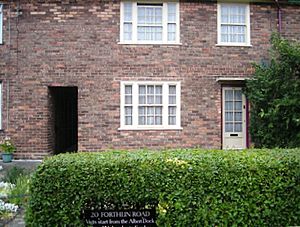
James Paul McCartney was born on 18 June 1942 in Liverpool, England. His mother, Mary, was a nurse, and his father, James (Jim), worked as a salesman. Paul has a younger brother, Peter Michael. The family moved several times in Liverpool during Paul's childhood.
Paul attended Stockton Wood Road Primary School and then Joseph Williams Junior School. In 1953, he passed an important exam that allowed him to attend the Liverpool Institute High School for Boys, a grammar school. On the bus to school in 1954, he met his future bandmate, George Harrison. They quickly became friends.
In 1955, Paul's family moved to 20 Forthlin Road in Allerton. This house became a special place for songwriting. Sadly, when Paul was 14, his mother died from complications after breast cancer surgery. This loss later connected him with John Lennon, whose mother also passed away when John was young.
Paul's father was a musician who played the trumpet and piano. He encouraged his sons to learn music. Paul preferred to learn by ear instead of taking formal lessons. For his 14th birthday, his father gave him a trumpet. But when rock and roll became popular, Paul traded it for an acoustic guitar so he could sing while playing. He wrote his first song, "I Lost My Little Girl", on this guitar. He also composed an early version of "When I'm Sixty-Four" on the piano. Paul was greatly influenced by American rhythm and blues, and Little Richard was his idol.
Music Career Highlights
Joining The Quarrymen
At age 15, on 6 July 1957, Paul McCartney met John Lennon and his band, the Quarrymen. They played a mix of rock and roll and skiffle, a type of popular music with jazz, blues, and folk influences. Soon after, Paul was invited to join the band as a rhythm guitarist. He and John quickly formed a strong songwriting team. George Harrison joined in 1958 as lead guitarist, and Stuart Sutcliffe joined on bass in 1960. By August 1960, the band had chosen the name the Beatles. They then found drummer Pete Best before going to perform in Hamburg, Germany.
The Beatles' Rise to Fame
In 1961, Stuart Sutcliffe left the band, and Paul became their bass player. While in Hamburg, the Beatles made their first professional recordings. They gained attention from Brian Epstein, who became their manager in January 1962. Ringo Starr replaced Pete Best in August. The band had their first hit song, "Love Me Do", in October. They became very popular in the UK in 1963, and in the US a year later. This huge fan excitement was called "Beatlemania". The press sometimes called Paul the "cute Beatle". Paul co-wrote many early hits with John Lennon, including "I Saw Her Standing There", "She Loves You", "I Want to Hold Your Hand" (1963), and "Can't Buy Me Love" (1964).
In August 1965, the Beatles released Paul's song "Yesterday", which featured a string quartet. This song was the group's first to use classical music elements. It was also their first recording that only involved one band member. "Yesterday" became one of the most covered songs in popular music history. Later that year, during recordings for the album Rubber Soul, Paul started to become a more dominant musical force in the band. Critics praised Rubber Soul as a big step forward in the band's music and lyrics.
In 1966, the Beatles released the album Revolver. This album showed an artistic leap for the band with its thoughtful lyrics and studio experiments. It included Paul's song "Eleanor Rigby", which featured a string octet. This song was unique because it only had Paul's lead vocal and strings arranged by producer George Martin.
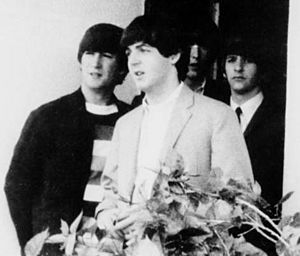
The band played their last public concert at the end of their 1966 US tour. After this, Paul felt the band needed to stay creative. He pushed them to start a new project, which became Sgt. Pepper's Lonely Hearts Club Band. This album is often seen as rock's first concept album. Paul came up with the idea of creating a new identity for the group, the fictional "Sgt. Pepper's Lonely Hearts Club Band". This allowed them to experiment and show their fans how much they had grown musically.
The album's cover, based on Paul's idea, featured the Beatles in costume with many famous people. This cover sparked a lot of discussion. When their manager Brian Epstein passed away in August 1967, Paul stepped up to lead the group. He suggested they make a film for television, which became Magical Mystery Tour. This film received mixed reviews. By late 1968, relationships within the band were becoming difficult, especially during the recording of the "White Album".
In March 1969, Paul married his first wife, Linda Eastman. Their first child, Mary, was born in August. Abbey Road was the last album the band recorded. In October 1969, a rumor spread that Paul had died in a car crash in 1966. This was quickly proven false when a Life magazine cover showed him and his family.
John Lennon quietly left the Beatles in September 1969. Paul announced his own departure from the group on 10 April 1970. He later filed a lawsuit for the band's official breakup on 31 December 1970. The Beatles' partnership was legally dissolved on 9 January 1975. The Beatles released many hit songs and albums, with Paul and John becoming one of the most famous songwriting teams of the 20th century.
Wings: A New Chapter
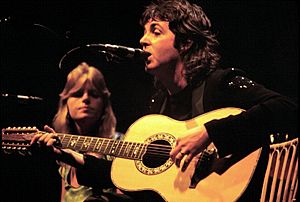
In 1970, Paul released his first solo album, McCartney, which became a US number-one album. In 1971, he worked with Linda and drummer Denny Seiwell on his second album, Ram. This album included the US number-one hit "Uncle Albert/Admiral Halsey". Later that year, ex-Moody Blues guitarist Denny Laine joined them to form the band Wings. Paul wanted to keep making music after the Beatles, and Wings allowed him to do that. In September 1971, Paul and Linda's daughter Stella was born.
Wings started their first concert tour in 1972, playing at universities across the UK in a van. They avoided playing Beatles songs during these early shows. Paul wanted to perform in smaller venues to feel less nervous after the huge success of the Beatles. In March 1973, Wings had their first US number-one single, "My Love". Paul also collaborated with Linda and former Beatles producer George Martin on "Live and Let Die", the theme song for the James Bond film. This song was nominated for an Academy Award.
After some band member changes, Paul, Linda, and Denny Laine recorded Band on the Run in 1973. This album became a huge success, reaching number one in both the US and UK. It was one of the best-selling albums of the decade. Rolling Stone magazine called it one of the Best Albums of the Year. In 1975, Paul McCartney and Wings won a Grammy Award for the song "Band on the Run".
Wings continued their success with albums like Venus and Mars (1975) and Wings at the Speed of Sound (1976). They went on a fourteen-month Wings Over the World Tour, which included stops in the UK, Australia, Europe, and the US. This tour was the first time Paul performed Beatles songs live with Wings. In September 1977, Paul and Linda's son James was born. In November, the Wings song "Mull of Kintyre" became one of the best-selling singles in UK chart history.
Wings released London Town (1978), which had a US number-one single ("With a Little Luck"). Their album Back to the Egg (1979) featured a rock supergroup called "Rockestra" on two tracks. Wings completed their final concert tour in 1979 in the UK.
In 1980, Paul released his second solo album, McCartney II, which reached number one in the UK. It included the song "Coming Up", which became Wings' last number-one hit. By 1981, Paul felt he had done all he could with Wings, and the group stopped performing together.
Solo Career and Collaborations
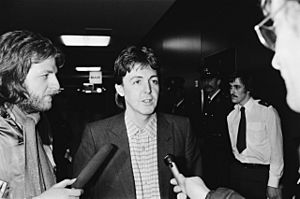
In 1982, Paul worked with Stevie Wonder on the number-one hit "Ebony and Ivory". He also collaborated with Michael Jackson on "The Girl Is Mine" from Jackson's album Thriller. "Ebony and Ivory" was Paul's 28th single to reach number one on the Billboard Hot 100 chart. The next year, he and Michael Jackson worked on "Say Say Say", which also became a US number one. Paul's song "Pipes of Peace" was a UK number one.
In 1984, Paul starred in Give My Regards to Broad Street, a film he also wrote and produced. The film's soundtrack album did very well, reaching number one in the UK. Paul participated in Live Aid in 1985, performing "Let it Be". In 1989, he released Flowers in the Dirt, which included collaborations with Elvis Costello. Paul then formed a new band and started the Paul McCartney World Tour in September 1989. During this tour, he performed for the largest paying stadium audience ever in Rio de Janeiro, Brazil, in 1990.
Later Projects and Continued Success
Paul explored orchestral music in 1991 with Liverpool Oratorio, a piece he created with composer Carl Davis. This work reached number one on the UK classical chart. In 1991, Paul performed acoustic songs on MTV Unplugged and released a live album of the show. During the 1990s, Paul also worked with Youth as the musical duo "the Fireman", releasing electronic music albums.
From 1994, Paul took a break from his solo career to work on the Beatles Anthology project with George Harrison, Ringo Starr, and George Martin. In 1997, Paul released the rock album Flaming Pie, which featured Ringo Starr. He also released the classical work Standing Stone and the electronic album Rushes with the Fireman. In 1999, he released Run Devil Run, an album of covers and new songs. This album was planned with his wife Linda, who passed away in April 1998.
In 2000, Paul released the electronic album Liverpool Sound Collage. He also contributed a song to A Garland for Linda, a tribute album for his late wife. After witnessing the September 11 attacks in 2001, Paul helped organize the Concert for New York City. His album Driving Rain (2001) included the song "Freedom" in response to the attacks. He then started the Driving World Tour in 2002 with a new band. This tour was very successful and led to the live album Back in the US.
In July 2002, Paul married Heather Mills. In November, he performed at the Concert for George, a tribute to George Harrison. Paul performed at the National Football League's Super Bowl in 2002 and headlined the halftime show in 2005. In 2005, he performed at the Live 8 event in London. He released the rock album Chaos and Creation in the Backyard in September 2005, playing most of the instruments himself. In 2007, he released the rock album Memory Almost Full. His third Fireman album, Electric Arguments, came out in 2008.
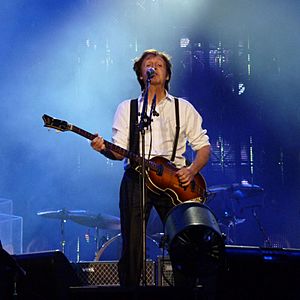
Paul's lasting fame means he often opens new venues. In 2009, he performed three sold-out concerts at the newly built Citi Field in New York. These shows led to the live album Good Evening New York City. In 2010, he opened the Consol Energy Center in Pittsburgh. In July 2011, he performed two sold-out concerts at the new Yankee Stadium. In August 2011, Paul signed with Decca Records. He also released his first score for dance, Ocean's Kingdom, in September 2011. Also in 2011, Paul married Nancy Shevell.
In February 2012, Paul released Kisses on the Bottom, a collection of classic songs. He was honored as the MusiCares Person of the Year that same month. In June 2012, Paul closed Queen Elizabeth's Diamond Jubilee Concert at Buckingham Palace. He also closed the opening ceremony of the 2012 Summer Olympics in London on 27 July, singing "The End" and "Hey Jude".
On 12 December 2012, Paul performed with former members of Nirvana at 12-12-12: The Concert for Sandy Relief. In October 2013, he released his studio album New. In May 2014, Paul had to cancel some tour dates due to a virus but resumed his tour in July. On 14 August 2014, he performed the final concert at Candlestick Park in San Francisco, the same place where the Beatles played their last concert for a paying audience in 1966. In 2014, Paul wrote and performed "Hope for the Future" for the video game Destiny. He also collaborated with rapper Kanye West on the single "Only One" and with West and singer Rihanna on "FourFiveSeconds" in 2015.
In February 2015, Paul performed with Paul Simon for the Saturday Night Live 40th Anniversary Special. In June 2016, he released Pure McCartney, a collection of songs from his career. Paul appeared in the 2017 adventure film Pirates of the Caribbean: Dead Men Tell No Tales in a small role as Uncle Jack.
On 7 September 2018, Paul released his album Egypt Station, which became his first album in 36 years to top the Billboard 200 chart. On 26 July 2018, Paul played a special concert at The Cavern Club in Liverpool, which was later broadcast by the BBC.
Paul's 18th solo album, McCartney III, was released on 18 December 2020. It became his first number-one solo album in the UK since 1989. This album was recorded during the COVID-19 lockdowns and features Paul playing all the instruments himself. A remix album, McCartney III Imagined, was released in April 2021.
Paul's book The Lyrics: 1956 to the Present was released in November 2021. This book is a "self-portrait in 154 songs" based on conversations with Irish poet Paul Muldoon. The Lyrics was named Book of the Year by major bookstores. Paul's "Got Back" tour ran from April to June 2022 in the United States. He headlined Glastonbury Festival on 25 June 2022, becoming the oldest solo headliner at the festival. In 2022, he won a Primetime Emmy Award for Outstanding Documentary or Nonfiction Series as a producer for the documentary The Beatles: Get Back.
In 2023, Paul published the book 1964: Eyes of the Storm, which features recently found photos he took during the height of Beatlemania. An exhibition of these photographs traveled to various venues. In February 2025, Paul performed for the Saturday Night Live 50th Anniversary Special. In May 2025, he released a new version of "My Valentine" as a duet with Barbra Streisand. In July 2025, Paul announced more dates for his Got Back tour across North America.
Paul's Musical Talents
Paul McCartney is mostly a self-taught musician. His approach to music has been described as natural and instinctive. He creates beautiful tunes that can stand alone, even without their harmonies. Paul compared his way of making music to "primitive cave artists, who drew without training."
Early Musical Inspirations
Paul's earliest musical influences include Elvis Presley, Little Richard, Buddy Holly, Carl Perkins, and Chuck Berry. He considered Elvis Presley too important to even mention on the Sgt. Pepper album cover. Paul called Little Richard an idol, and his powerful singing style inspired Paul's own vocal techniques. In 1971, Paul bought the rights to Buddy Holly's songs. He also started the annual "Buddy Holly Week" in England in 1976 to celebrate Holly's music.
Bass Guitar Skills
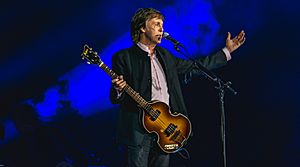
Paul McCartney is well-known for playing the bass guitar, often using a plectrum (pick), but sometimes playing with his fingers. He was greatly influenced by Motown artists, especially James Jamerson, whom Paul called a hero for his melodic bass lines. He was also inspired by Brian Wilson of the Beach Boys. Other bassists like Sting and Dr. Dre's bassist Mike Elizondo have praised Paul's bass playing.
Paul is consistently ranked among the best bass players ever. He was voted the best rock bassist in Creem magazine's reader polls in 1973 and 1974. Rolling Stone magazine ranked him the ninth greatest bassist of all time in 2020.
In his early years with the Beatles, Paul mainly used a Höfner 500/1 bass. From 1965, he also liked his Rickenbacker 4001S for recording. He often used Vox amplifiers. Paul's bass playing became much more developed around 1964, especially on songs like "She's a Woman" and "Rain". His bass line on "Rain" is considered amazing, showing his ability to think about both rhythm and melody. Paul believes his strongest and most creative bass playing is on Sgt. Pepper's Lonely Hearts Club Band, especially on "Lucy in the Sky with Diamonds".
Acoustic Guitar Style
If I couldn't have any other instrument, I would have to have an acoustic guitar.
Paul mainly uses a pick when playing acoustic guitar, but he also uses fingerpicking. You can hear his acoustic guitar playing on Beatles songs like "Yesterday", "Michelle", "Blackbird", "I Will", "Mother Nature's Son", and "Rocky Raccoon". Paul considers "Blackbird" a personal favorite. He used an Epiphone Texan on many of his acoustic recordings.
Electric Guitar Contributions
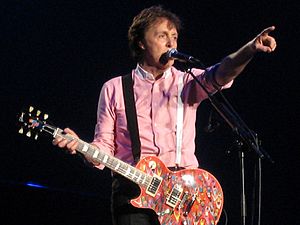
Paul played lead guitar on several Beatles recordings. This includes a "fiercely angular slide guitar solo" on "Drive My Car", which he played on an Epiphone Casino. He said the Casino was his favorite electric guitar. He also played the "shrieking" guitar on "Sgt. Pepper's Lonely Hearts Club Band" and "Helter Skelter".
During his time with Wings, Paul usually let other band members play electric guitar. However, he played most of the lead guitar on the album Band on the Run. When asked about his favorite guitar players in 1990, he mentioned Eddie Van Halen, Eric Clapton, and David Gilmour, but said he still liked Hendrix the best. He often uses a Gibson Les Paul for live electric guitar performances.
Vocal Range and Styles
Paul McCartney is known for his powerful and versatile singing voice, which covers more than four octaves. Rolling Stone ranked him the 11th greatest singer of all time. Many famous singers, including Chris Cornell, Billy Joel, and Steven Tyler, have said Paul influenced their vocals.
Paul's singing has covered many music styles. On "Call Me Back Again", he shows a bluesy solo voice. "I'm Down" is a rock-and-roll classic that shows his vocal versatility. "Helter Skelter" was an early attempt at heavy metal, and "Hey Jude" is a mix of pop and rock. Paul's vocals on "She's a Woman" were described as "at the edge," showing his powerful chest voice. He continued to experiment with different vocal styles throughout his career after the Beatles.
Keyboard and Drumming Skills
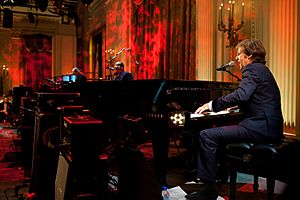
Paul played piano on several Beatles songs, including "She's a Woman", "For No One", "A Day in the Life", "Hello, Goodbye", "Lady Madonna", "Hey Jude", "Martha My Dear", "Let It Be", and "The Long and Winding Road". He also used a Mellotron on "Strawberry Fields Forever" and a Moog synthesizer on "Maxwell's Silver Hammer".
Paul also played drums on some Beatles songs, such as "Back in the U.S.S.R.", "Dear Prudence", and "The Ballad of John and Yoko". He played all the drum parts on his solo albums McCartney, McCartney II, and McCartney III, and most of the drums on Wings' Band on the Run.
Paul's Personal Life
Creative Interests Beyond Music
When Paul was in school, he was very good at art. In the 1960s, he explored visual arts and experimental films. He learned about art from art dealer Robert Fraser and met famous artists like Andy Warhol. Paul later bought artworks by Magritte, whose painting of an apple inspired the Apple Records logo. He also helped start the Indica Gallery in London, where John Lennon first met Yoko Ono.
Paul became interested in painting after watching artist Willem de Kooning work. He started painting in 1983 and first showed his work in Germany in 1999. His first UK art exhibition opened in Bristol in 2000, featuring 500 of his paintings. Paul is a lead supporter of the Liverpool Institute for Performing Arts, a school in the building where he once attended high school.
Paul's mother read him poems when he was a child, and his father encouraged him and his brother to solve crosswords to improve their "word power." In 2001, Paul published Blackbird Singing, a book of his poems and song lyrics. His first children's book, High in the Clouds: An Urban Furry Tail, was published in 2005. It tells the story of a squirrel whose home is destroyed by developers. In 2018, he wrote the children's book Hey Grandude!, followed by Grandude's Green Submarine in 2021.
Paul also worked on animated films. In 1981, he wrote and produced Rupert and the Frog Song. In 1992, he worked on an animated film about French artist Honoré Daumier, which won them a BAFTA award. In 2004, they worked on Tropic Island Hum. He also produced and hosted The Real Buddy Holly Story, a 1985 documentary. In 1995, he made a guest appearance on The Simpsons episode "Lisa the Vegetarian".
Business Ventures
Since 1989, Paul McCartney has been the UK's wealthiest musician. Besides his interest in Apple Corps, he owns MPL Communications, a company that manages his business interests. This company has access to over 25,000 copyrights, including the rights to musicals like Guys and Dolls and Grease. He has earned tens of millions of pounds each year from his music and business ventures.
Paul signed his first recording contract with Parlophone Records as a member of the Beatles in 1962. After the Beatles formed their own label, Apple Records, in 1968, their music was released through Apple. After the Beatles broke up, Paul continued to release music through Apple Records until 1976. He later signed with Columbia Records in the US and Canada, and then returned to Capitol Records in 1985. In 2007, Paul signed with Hear Music.
In 1963, a company called Northern Songs was created to publish the songs of Lennon–McCartney. Paul and John Lennon later sold their shares in this company. Since 1979, MPL Communications has published Paul's songs.
Vegetarianism and Activism
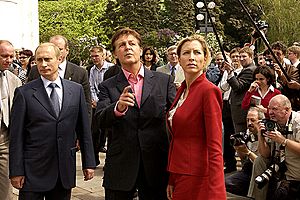
Paul McCartney has been a vegetarian since 1975. He and his first wife, Linda, became vegetarians after seeing lambs in a field while eating lamb for a meal. They became strong supporters of animal rights. After Linda's passing, Paul promised to continue working for animal rights. He supports organizations like People for the Ethical Treatment of Animals (PETA). In 2009, Paul narrated a video for PETA called "Glass Walls," which criticized slaughterhouses and the meat industry.
After marrying Heather Mills, Paul joined her in a campaign against land mines. He became a patron of Adopt-A-Minefield. In 2003, Paul and Heather met with Vladimir Putin in Moscow to encourage Russia to join the anti-landmine campaign. In 2006, they traveled to Prince Edward Island to raise awareness about seal hunting. Paul also supports the Make Poverty History campaign.
Paul has participated in many charity recordings and performances, including Live Aid and Live 8. In 2004, he donated a song to an album supporting the "US Campaign for Burma." In 2008, he donated a song to Aid Still Required's CD, which raised funds for recovery efforts after the 2004 tsunami in Southeast Asia. In 2012, Paul joined the anti-fracking campaign Artists Against Fracking. He is also a supporter of the Save the Arctic campaign. In 2015, Paul spoke out against bringing back fox hunting in Britain, calling it "cruel and unnecessary." During the COVID-19 pandemic, Paul called for Chinese wet markets to be banned due to health concerns and animal cruelty.
Football Allegiance
Paul McCartney has publicly supported both Everton F.C. and Liverpool F.C., two football clubs from his hometown. In 2008, he clarified his allegiance, saying that his family are officially Everton fans, so he would support Everton in a derby match. However, he also supports Liverpool because "it's all Liverpool."
Family and Relationships
Paul McCartney has been married three times. His first serious girlfriend in Liverpool was Dorothy "Dot" Rhone. Later, he had a five-year relationship with British actress Jane Asher.
Linda Eastman
Paul met Linda Eastman, an American photographer, in London in 1967. They married in March 1969. Paul said they had "a lot of fun together" and enjoyed just "hanging out." After the Beatles broke up, Paul and Linda formed the band Wings in 1971. Some fans and critics questioned Linda's role in the band, but Paul defended her musical ability.
Paul and Linda had four children: Linda's daughter Heather (whom Paul adopted), Mary, Stella, and James. They remained married until Linda's passing from breast cancer in 1998. Paul later shared that he sought counseling to help him cope with his grief and guilt after her death.
Heather Mills
In 2002, Paul married Heather Mills, a former model and activist. In 2003, they had a child named Beatrice Milly. They separated in April 2006 and divorced in May 2008.
Nancy Shevell
Paul McCartney married New Yorker Nancy Shevell in a civil ceremony in London on 9 October 2011. The wedding was a small event with about 30 family members and friends. Nancy is a businesswoman and they had known each other for about 20 years before they married.
Relationships with The Beatles
John Lennon
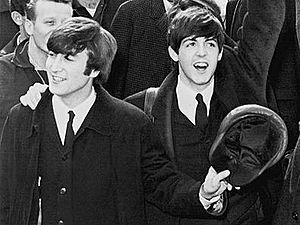
After the Beatles broke up, Paul and John Lennon had a difficult relationship at times. However, they did become close again briefly in early 1974 and even played music together on one occasion. Paul often called John, but sometimes felt unsure about how he would be received. They would often talk about everyday things like cats or baking bread to avoid only discussing business.
Paul's last phone call with John, just days before John's album Double Fantasy was released, was friendly. Paul later said this was a comforting memory for him, as they never fully resolved their differences.
When John Lennon passed away in December 1980, Paul was deeply affected. He later explained that his initial public reaction, which seemed brief, was actually filled with deep sadness. He described his first conversation with Yoko Ono after John's passing, where she told him, "John was really fond of you." Paul said that John was always a warm person beneath his tough exterior. In 1983, Paul expressed regret that he hadn't tried harder to connect with John before his passing. He said that John's passing made the remaining Beatles nervous about their own safety. In 2002, Paul told Mojo magazine that John was his greatest hero. Paul released "Here Today" in 1982, a song that pays tribute to his friendship with John.
George Harrison
George Harrison sometimes felt that Paul was very focused on his own songs during the Beatles' recording sessions. George said that Paul would help with his songs only after his own were done. However, George also played bass on many tracks.
After George Harrison's passing in November 2001, Paul said he was "a lovely guy and a very brave man who had a wonderful sense of humour." He added, "We grew up together and we just had so many beautiful times together—that's what I am going to remember. I'll always love him, he's my baby brother." On the first anniversary of George's passing, Paul played George's song "Something" on a ukulele at the Concert for George. He has continued to perform this song on many of his solo tours.
Ringo Starr
During a recording session for The Beatles in 1968, Paul and Ringo had an argument about Ringo's drum part for "Back in the U.S.S.R." This led to Ringo temporarily leaving the band. Ringo later commented that Paul is a great bass player but also very determined to get his own way, which sometimes led to musical disagreements.
Paul and Ringo have worked together on several projects after the Beatles. In 1973, Paul contributed to Ringo's album Ringo. Ringo appeared in Paul's 1984 film Give My Regards to Broad Street and played drums on most of the soundtrack. Ringo also played drums and sang backing vocals on "Beautiful Night" from Paul's 1997 album Flaming Pie. They collaborated again on Ringo's album Vertical Man in 1998.
In 2009, Paul and Ringo performed "With a Little Help from My Friends" at a benefit concert. They also worked together on Ringo's album Y Not in 2010. On 7 July 2010, Paul made a surprise appearance at Ringo's 70th birthday concert, performing the Beatles' song "Birthday" with Ringo's band. On 26 January 2014, Paul and Ringo performed "Queenie Eye" from Paul's album New at the 56th Annual Grammy Awards. Paul inducted Ringo into the Rock and Roll Hall of Fame in April 2015. Ringo and Ronnie Wood joined Paul on stage to perform "Get Back" at his concert in London in December 2018. Ringo also appeared on the final day of Paul's Freshen Up tour in July 2019. Ringo and Ronnie Wood joined Paul again at the O2 Arena in London in December 2024, performing the same three songs. Paul performed "Get Back" with his original Höfner 500/1 bass, which had been missing since 1972 and was recently found.
Paul McCartney's Legacy
Major Achievements
Paul McCartney was inducted into the Rock and Roll Hall of Fame twice: first in 1988 as a member of the Beatles, and again in 1999 as a solo artist. In 1979, the Guinness Book of World Records recognized Paul as the "most honored composer and performer in music." He had 60 gold discs (43 with the Beatles, 17 with Wings) and, as a Beatle, sold over 100 million singles and 100 million albums. He was also named the "most successful song writer" for writing or co-writing 43 songs that sold over one million records between 1962 and 1978. In 2009, Guinness World Records again recognized him as the "most successful songwriter" for having written or co-written 188 charted records in the UK, with 33 reaching number one.
Paul has written or co-written 32 number-one singles on the Billboard Hot 100 chart. Twenty of these were with the Beatles, and seven were solo or with Wings. He also co-wrote "A World Without Love" for Peter and Gordon, and "Say Say Say" with Michael Jackson. He wrote "Ebony and Ivory" performed with Stevie Wonder. By 2009, he had sold 15.5 million certified units in the United States as a solo artist, plus another 10 million with Wings.
Paul has had more number-one hits in the UK than any other artist, with twenty-four chart-topping singles. He is the only artist to reach number one in the UK as a soloist ("Pipes of Peace"), a duo ("Ebony and Ivory" with Stevie Wonder), a trio ("Mull of Kintyre" with Wings), a quartet ("She Loves You" with the Beatles), a quintet ("Get Back" with the Beatles and Billy Preston), and as part of a charity musical group (Ferry Aid).
"Yesterday" is one of the most covered songs in history, with over 2,200 recorded versions. It has been played over seven million times on American TV and radio. His 1968 Beatles song "Hey Jude" was the best-selling single in the UK that year and topped the US charts for nine weeks. It was also the longest single released by the band at the time. "Hey Jude" is the best-selling Beatles single, selling over five million copies soon after its release.
In July 2005, Paul's performance of "Sgt. Pepper's Lonely Hearts Club Band" with U2 at Live 8 became the fastest-released single in history. It was available within 45 minutes of its recording and quickly reached number one on the UK Official Download Chart.
In December 2020, his album McCartney III reached number 2 on the US Billboard 200 chart. This made Paul the first artist to have a new album in the top two chart positions in each of the last six decades.
Awards and Recognitions
Paul McCartney has received many awards and honors throughout his career:
- He has won 19 Grammy Awards:
- Ten as a member of the Beatles
- Six as a solo artist
- Two as a member of Wings
- One as part of a joint collaboration
- He has been inducted into the Rock and Roll Hall of Fame twice:
- In 1988 as a member of the Beatles
- In 1999 as a solo artist
- In 1965, he was appointed a Member of the Order of the British Empire.
- In 1971, he won an Academy Award as a member of the Beatles.
- In 1997, he was Knighted by Queen Elizabeth II for his contributions to music.
- In 2000, he received a Fellowship into the British Academy of Songwriters, Composers and Authors.
- In 2008, he received a BRIT Award for Outstanding Contribution to Music.
- In 2010, he received the Gershwin Prize for his contributions to popular music.
- In 2010, he was honored at the Kennedy Center Honors.
- In 2012, he received a Star on the Hollywood Walk of Fame.
- In 2012, he was awarded the Légion d'Honneur for his services to music.
- In 2012, he was named MusiCares Person of the Year.
- In 2015, asteroid 4148 McCartney was named after him.
- In 2017, he was appointed a Member of the Order of the Companions of Honour (CH) for his services to music.
 |
|
Discography
Solo Albums
- McCartney (1970)
- Ram (1971) (with Linda McCartney)
- McCartney II (1980)
- Tug of War (1982)
- Pipes of Peace (1983)
- Give My Regards to Broad Street (1984)
- Press to Play (1986)
- CHOBA B CCCP (1988)
- Flowers in the Dirt (1989)
- Off the Ground (1993)
- Flaming Pie (1997)
- Run Devil Run (1999)
- Driving Rain (2001)
- Chaos and Creation in the Backyard (2005)
- Memory Almost Full (2007)
- Kisses on the Bottom (2012)
- New (2013)
- Egypt Station (2018)
- McCartney III (2020)
Wings Albums
- Wild Life (1971)
- Red Rose Speedway (1973)
- Band on the Run (1973)
- Venus and Mars (1975)
- Wings at the Speed of Sound (1976)
- London Town (1978)
- Back to the Egg (1979)
- One Hand Clapping (2024) (live-in-studio album)
Classical Albums
- Paul McCartney's Liverpool Oratorio (1991) (with Carl Davis)
- Standing Stone (1997)
- Working Classical (1999)
- Ecce Cor Meum (2006)
- Ocean's Kingdom (2011) (dance score with Peter Martins)
The Fireman Albums (McCartney and Youth)
- Strawberries Oceans Ships Forest (1993)
- Rushes (1998)
- Electric Arguments (2008)
Other Albums
- The Family Way (1967) (soundtrack)
- Thrillington (1977) (Ram instrumental)
- Liverpool Sound Collage (2000) (with Super Furry Animals & The Beatles archival sound)
- Twin Freaks (2005) (remix album with DJ Freelance Hellraiser)
- McCartney III Imagined (2021) (remix album)
Filmography
Films
| Year | Title | Role | Notes |
|---|---|---|---|
| 1964 | A Hard Day's Night | Himself | |
| 1965 | Help! | Himself | |
| 1967 | Magical Mystery Tour | Himself / Major McCartney / Red-Nosed Magician (uncredited) | Director (writer and producer uncredited) |
| 1968 | Yellow Submarine | Himself (uncredited) | Animated, based upon a song by Lennon–McCartney |
| 1970 | Let It Be | Himself | Documentary |
| 1977 | The Day the Music Died | Himself | Documentary |
| 1980 | Concert for Kampuchea | Himself | Documentary |
| Rockshow | Himself | Documentary | |
| 1982 | The Cooler | Cowboy | Short, executive producer |
| The Compleat Beatles | Himself | Documentary | |
| 1984 | Give My Regards to Broad Street | Himself | Screenplay, producer, actor |
| 1985 | Rupert and the Frog Song | Rupert / Edward / Bill / Boy Frog (voice) | Animated short, writer, executive producer |
| 1987 | Eat the Rich | Banquet Rich | Cameo |
| The Real Buddy Holly Story | Himself | Documentary, producer | |
| 1990 | The Beatles: The First U.S. Visit | Himself | Documentary |
| 1991 | Get Back | Himself | Documentary |
| 1992 | Daumier's Law | Animated short, music, writer, executive producer | |
| 1997 | Tropic Island Hum | Wirral / Froggo / Bison / Various (voice) | Animated short, writer, executive producer |
| 2000 | Shadow Cycle | Animated short, writer | |
| 2001 | Tuesday | Himself (voice) | Animated short, executive producer |
| 2003 | Mayor of the Sunset Strip | Himself | Documentary |
| Concert for George | Himself | Documentary | |
| 2008 | Tribute This! | Himself | Documentary |
| All Together Now | Himself | Documentary | |
| 2009 | Brüno | Himself | Cameo |
| Al's Brain in 3-D | Man on the Street | Short | |
| 2010 | David Wants to Fly | Himself | Documentary |
| The Last Play at Shea | Himself | Documentary | |
| 2011 | The Love We Make | Himself | Documentary |
| George Harrison: Living in the Material World | Himself | Documentary | |
| 2013 | Sound City | Himself | Documentary |
| 12-12-12 | Himself | Documentary, producer | |
| 2014 | Finding Fela | Himself | Documentary |
| Glen Campbell: I'll Be Me | Himself | Documentary | |
| 2016 | The Beatles: Eight Days a Week | Himself | Documentary |
| 2017 | Pirates of the Caribbean: Dead Men Tell No Tales | Uncle Jack | Cameo |
| 2018 | Quincy | Himself | Documentary |
| The Bruce McMouse Show | Himself | Unreleased Wings concert film with animation produced from 1972 to 1977, theatrical release 2019 | |
| 2022 | If These Walls Could Sing | Himself | Documentary directed by Mary McCartney |
| 2024 | Stevie Van Zandt: Disciple | Himself | Documentary |
Television Shows
| Year | Title | Role | Notes |
|---|---|---|---|
| 1963–64 | Ready Steady Go! | Himself | Music programme, 3 episodes |
| 1964 | Around the Beatles | Himself | Concert special |
| What's Happening! The Beatles in the U.S. | Himself | Documentary | |
| 1964–65 | The Ed Sullivan Show | Himself | Variety show, 4 episodes |
| 1965 | The Music of Lennon & McCartney | Himself | Variety tribute special |
| 1966 | The Beatles at Shea Stadium | Himself | Concert special |
| The Beatles in Japan | Himself | Concert special | |
| 1973 | James Paul McCartney | Himself | TV special |
| 1975 | A Salute to the Beatles: Once upon a Time | Himself | Documentary |
| 1977 | All You Need Is Love: The Story of Popular Music | Himself | Documentary mini-series |
| 1985 | Live Aid | Himself | Benefit concert special |
| 1987 | It Was Twenty Years Ago Today | Himself | Documentary |
| 1988 | The Power of Music | Himself, narrator | Documentary |
| 1995 | The Simpsons | Himself (voice) | Episode: "Lisa the Vegetarian" |
| The Beatles Anthology | Himself | Documentary mini-series | |
| 1997 | Music for Montserrat | Himself | Benefit concert special |
| 2001 | Wingspan | Himself | Documentary |
| The Concert for New York City | Himself | Benefit concert special | |
| 2005 | Live 8 | Himself | Benefit concert special |
| Saturday Night Live | Paul Simon | Episode: "Alec Baldwin/Christina Aguilera" | |
| 2012 | 30 Rock | Himself | Episode: "Live from Studio 6H" (East Coast airing only) |
| 2015 | BoJack Horseman | Himself (voice) | Episode: "After the Party" |
| 2021 | McCartney 3,2,1 | Himself | Documentary mini-series |
| The Beatles: Get Back | Himself | Documentary mini-series |
Concert Tours
Wings Tours
- Wings University Tour (1972)
- Wings Over Europe Tour (1972)
- Wings 1973 UK Tour (1973)
- Wings Over the World tour (1975–1976)
- Wings UK Tour 1979 (1979)
Solo Tours
- The Paul McCartney World Tour (1989–1990)
- Unplugged Tour 1991 (1991)
- The New World Tour (1993)
- Driving World Tour (2002)
- Back in the World Tour (2003)
- '04 Summer Tour (2004)
- The 'US' Tour (2005)
- Secret Tour 2007 (2007)
- Summer Live '09 (2009)
- Good Evening Europe Tour (2009)
- Up and Coming Tour (2010–2011)
- On the Run (2011–2012)
- Out There (2013–2015)
- One on One (2016–2017)
- 2018 Secret Gigs (2018)
- Freshen Up (2018–2019)
- Got Back (2022–2025)
See also
 In Spanish: Paul McCartney para niños
In Spanish: Paul McCartney para niños
- Grammy Award records – Most Grammys won by a male artist
- List of animal rights advocates
- List of British Grammy winners and nominees
- List of highest-grossing live music artists
- Paul is dead – urban legend/conspiracy theory that Paul McCartney is dead
- List of celebrities by net worth
- List of largest music deals
- Outline of the Beatles
- The Beatles timeline



